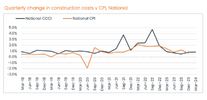- Apr 2, 2013
- 12,581
- 19,850
- AFL Club
- Collingwood
Very emotive topic. But partisan.
There is the just work harder types not eat avaacado types
The back in my day types
The it's not so bad types
The communist everyone has stolen everything types so let's lock up everyone types
The it's all colonisation types.
But what the actual **** is the solution?
Like a real actual solution. There is no point denying there is a problem because clearly there is one.
So how does the country solve it?
My $0.02
Need to disincentive investment property which is a scurge on the country. 75% discount for primary residence 200% increase for second property
Tax breaks for those who build first homes.
Fast rail between regional and major cities.
GST funding dependent on states providing social housing
There is the just work harder types not eat avaacado types
The back in my day types
The it's not so bad types
The communist everyone has stolen everything types so let's lock up everyone types
The it's all colonisation types.
But what the actual **** is the solution?
Like a real actual solution. There is no point denying there is a problem because clearly there is one.
So how does the country solve it?
My $0.02
Need to disincentive investment property which is a scurge on the country. 75% discount for primary residence 200% increase for second property
Tax breaks for those who build first homes.
Fast rail between regional and major cities.
GST funding dependent on states providing social housing






